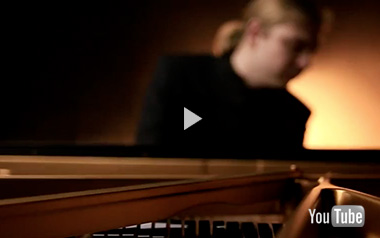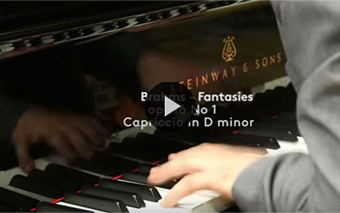Next Concerts
February 19, 2026
Odense
Odense C, Denmark
Ravel: Piano Concerto in G major, M.83
– Pierre Bleuse (conductor)
Venue: Odense Concert Hall, Odense
Mar 7, 2026
Netherlands Philharmonic / European Tour
Amsterdam, Netherlands
Brahms: Piano Concerto No.2 in B-flat major, Op.83
– Lorenzo Viotti (conductor)
Venue: The Concertgebouw, Amsterdam
REVIEWS
Apr 02 2013
Recording: Prokofiev Pianos Sonatas Nos. 6, 7 and 8 (Onyx Classics, ONYX 4111)
“26 year-old Denis Kozhukhin arrives on the recording scene fully-fledged, like Athena springing from the head of Zeus. Intellect is central: I’ve never heard so much revelatory detail in Prokofiev’s triptych of dark and painful masterpieces. Kozhukhin has a way of bringing out the detail of the inner parts, or even a usually inconsequential-seeming bass line, that highlights the drama instead of distracting from it; there’s so much internal play in the droll march-scherzo of the Sixth Sonata, so much genius revealed about the way Prokofiev elaborates or dislocates the minuet theme at the heart of the Eighth. The touch is one that the composer-pianist would probably applaud: clear rather than dry, recorded with superb presence and ringing treble, bringing in the sustaining pedal with mesmerising care only to nuance the more pensive themes…
Kozhukhin does pull all the strands together in the great parade of the Eighth’s concluding vivace, a stunning tour de force at the end of an always though-provoking trilogy”.
BBC Music Magazine, five stars, May 2013
Mar 18 2013
Royal Liverpool Philharmonic Orchestra / Vasily Petrenko / Prokofiev Piano Concerto No. 3
“Despite his youth, [Denis Kozhukhin] was clearly the equal of the composer’s many demands… he played with blissful fluidity and a fine sense of drama, bouncing off his stool as he fired through rapid rattle phrases and floating over the keys in a style both musically expressive and technically authoritative.”
Liverpool Echo, March 2013
“Denis Kozhukhin’s fingers did a bit of dancing through the lyric and motoric delights of Prokoviev’s Third Piano Concerto. Now this really is all about articulation and Kozhukhin and Petrenko were telepathically like-minded about the piece, luxuriating in its beauty (how ravishing the Gavotte and its variations are in the middle movement) but equally reveling in the dizzying incandescence of the finale’s final pages. Kozhukhin returned with more ravishment, albeit quieter and more reflective, in his encore – an exquisite Gluck arrangement with more than a touch of Bach in the mix.”
Edward Seckerson, March 2013
Feb 28 2013
Louisiana Museum of Modern Art / Schubert, Ligeti, Prokofiev & Haydn
“As far as piano technique goes Denis Kozhukhin from Novgorod is already on his way into the comprehensive and respect-commanding Hall of Fame of the Russian piano school…
Denis Kozhukhin has a consummate feeling both for the provocative and the sensitive in Prokofiev’s music, and the many virtuoso elements in the intense work, which requires much playing with crossed hands, was no problem…
He made Ligeti’s demanding brilliance sound so romantic and nostalgic in the treatment of melody and made the quite unplayable ‘The Devil’s Staircase’ so madly captivating in the heaven-storming stampede of the etude (which ends in the blackest of holes!)… a quick Haydn sonata with colours and nuances, and Chopin’s ‘Raindrop Prelude’ at the end only reinforced the impression that Kozhukhin is the man of the future.”
Politiken, February 2013
Feb 05 2013
Recital at Tokyo Opera City / Chopin
“If I were a pianist, and if I faced this great talent, I would have to despair in myself…
Kozhukhin’s left hand especially displays noteworthy strength. Basic arpeggios were established precisely, allowing the right hand freedom for nuance and sensitivity. For example, in the beginning of the second Sonata, I was surprised that only the left hand resonated at first, but from thereon the melodic line and inner voice appeared little by little. It was vivid and reminded me of a 3D effect.
There were also many of unforgettable moments in Preludes, for example, the beauty of the long trill in the left hand in No. 9, the heavenly pianissimo in No. 15, and the jazz-like improvisation in No. 16 and 24…
The encores were by Bach and Schubert. After two hours of flamboyant music, the subtle charm of these encores was breathtaking.”
Yomiuri Evening Newspaper, February 2013
Jan 20 2013
SWR2 Internationale Pianisten in Mainz / Haydn, Franck, Ligeti & Liszt
“The ecstatic last notes of Györgi Ligeti’s etude “L’escalier du Diable” linger for a while until they finally fade away. Denis Kozhukhin, 26, seems content and relaxed and there is no way of telling that just a moment before he drew the audience at the Frankfurter Hof into a whirl of obsessed, dazzling, overlapping runs, harmonies, sounds and tempi.
The Hungarian composer Ligeti loves the complicated in music and the optical illusions in visual art. In the young Russian pianist, who won first prize at the renowned international piano competition “Concours Reine Elisabeth”, Ligeti seems to have posthumously found the ideal interpreter of his compositions.
The highly complex “Etudes pour piano” have as little in common with finger exercises as times tables do with Fermat’s rule. They are a daunting and on occasion acoustically overtaxing accumulation of technical and musical difficulties. Denis Kozhukhin simply breaks them down with perfection and a rarely heard sensitivity for the sound. His expressive way of playing shows his profound understanding of musical structures…
Franz Liszt’s “Etudes d’execution transcendante” were in his time considered to be “unplayable and unenjoyable”. From the “Wilde Jagd” and its punctuated runs or the watercolour-like nuances of “Harmonies du Soir” to the pathetically told story about the page “Mazzeppa”– Kozhukhin is incredibly sharp both in terms of technique and interpretation.
And he certainly managed to commit this to the audience’s memory not least with the encores he gave, one of which was Gluck’s “Plainte d’Orfee”.
Allgemeine Zeitung, January 2013
Jul 25 2012
City of London Festival / Mussorgsky
“Kozhukhin’s intensity was expressed through colour and wit and a keen sense of pacing, particularly in the closing piece, Mussorgsky’s Pictures at an Exhibition. He brought out the humour in the ‘Ballad of the Unhatched Chicks’ unexpected stops and starts, and the wicked glints in ‘The Hut on Fowl’s Legs’. The final picture, the ‘Great Gate of Kiev’, pushes some pianists beyond their limit. But in Kozhukhin’s hands it rose to the final peroration with magnificent, unforced grandeur.”
The Daily Telegraph, July 2012
Apr 27 2012
BBC Scottish Symphony Orchestra / Ludovic Morlot / Prokofiev Piano Concerto No. 5
“It has been a triumphal innings for Denis Kozhukhin in Glasgow, where over the last few months he has played all of Prokofiev’s piano concertos with the BBC Scottish Symphony Orchestra. The first marked the 26-year-old’s UK professional debut; at this final concert, the sold-out City Halls cheered him with the fondness they would a local lad.
He saved the mighty fifth concerto until last, tackling it with the same blithe bravura as he had the other four. Even having to learn three of the concertos from scratch did not phase Kozhukhin, who always seems to be enjoying himself. His cheerful assurance never comes across as hubris, though: he is attentive and gracious with the orchestra, and technically breezy, fingers buoyant on the keys no matter how dense Prokofiev’s writing. His sound is percussive but not harsh, forceful but never overwhelming, cheeky but not mean or sarcastic. He breathed gentle space into the Larghetto and easy swing into the Moderato’s opening offbeats. This was a young man’s Prokofiev, sincere and quirky and inquisitive.”
The Guardian, April 2012
“The night belonged to the sensational young Russian pianist Denis Kozhukhin, completing his survey of Prokofiev’s Piano Concertos with a spectacularly mind-boggling performance of the brilliant Fifth Concerto.
His nimble, flying virtuosity is a mix of weightless, supple, acrobatic display and power with a steel core; but his witty characterisations, from the quirky second movement to the madcap antics of the finale, were genius in action. Glorious.”
The Herald Scotland, April 2012


